
Intelligent Decision Technologies-Netherlands
Scope & Guideline
Connecting Minds to Transform Decision Technologies.
Introduction
Aims and Scopes
- Artificial Intelligence and Machine Learning:
The journal emphasizes the development and application of AI and machine learning techniques for solving complex problems across various fields, including healthcare, finance, and smart cities. - Optimization Techniques:
A significant focus is placed on optimization methodologies such as metaheuristics, hybrid algorithms, and machine learning-driven optimization for improving system efficiency and performance. - Data Analytics and Big Data:
Research that leverages big data analytics, including data mining, clustering, and classification, to extract meaningful insights and support decision-making is central to the journal's scope. - Intelligent Systems for Healthcare:
There is a strong commitment to exploring intelligent systems in healthcare, including diagnostic tools, disease prediction models, and personalized medicine applications. - Interdisciplinary Applications:
The journal encourages submissions that apply intelligent decision technologies to diverse fields such as transportation, environmental management, and cybersecurity. - Human-Centric AI:
Research that examines the interaction between humans and AI systems, focusing on user experience, ethical implications, and decision support systems, is also a core area of interest.
Trending and Emerging
- Integration of AI with IoT:
Recent publications increasingly focus on the convergence of AI technologies with Internet of Things (IoT) systems, exploring smart solutions for real-time decision-making and automation. - Explainable AI (XAI):
There is a growing emphasis on developing explainable AI models that enhance transparency and trust in automated decision-making processes, particularly in critical areas such as healthcare. - Sustainability and Green Technologies:
Research related to environmental sustainability, including the optimization of energy consumption and resource management using intelligent systems, has gained traction. - Cybersecurity Applications:
The journal has seen a rise in studies addressing the application of intelligent decision technologies in enhancing cybersecurity measures, particularly in the context of IoT and blockchain. - Personalized Medicine and Health Informatics:
Emerging themes in personalized health solutions, predictive analytics for disease management, and the integration of AI in medical diagnostics reflect a significant trend within the journal. - Multimodal Learning Approaches:
There is an increasing interest in multimodal learning techniques that integrate various data sources (text, images, etc.) to improve decision-making accuracy and robustness.
Declining or Waning
- Traditional Statistical Methods:
There has been a noticeable decrease in the publication of papers focused on conventional statistical methodologies, as researchers increasingly favor advanced machine learning and AI techniques for data analysis. - Basic Rule-Based Systems:
The interest in simple rule-based systems has diminished, with a shift towards more complex algorithms that incorporate learning and adaptability. - Generalized Theoretical Models:
Research that focuses solely on theoretical frameworks without empirical validation or practical application has seen reduced focus, as the journal prioritizes studies that demonstrate real-world impact. - Non-AI Based Decision Support Systems:
There is a declining trend in submissions related to traditional decision support systems that do not leverage AI or machine learning, reflecting a broader shift towards intelligent systems. - Narrow Domain Applications:
Papers concentrating on niche applications without broader implications or integrations into larger systems have become less common, as interdisciplinary approaches gain more attention.
Similar Journals

COMPUTING AND INFORMATICS
Exploring the Frontiers of Computer ScienceCOMPUTING AND INFORMATICS is a peer-reviewed academic journal published by the Slovak Academy of Sciences Institute of Informatics, focusing on various aspects of computer science and its applications. Established in 2000, this journal has garnered attention for its emphasis on computational theory, computer networks, software development, and hardware architecture, placing it in the competitive landscape of academic publishing with currently a Q3 ranking in the fields of Computational Theory and Mathematics, and Computer Networks and Communications, as well as Q4 ranking in Software and Hardware and Architecture categories. Readers can access its findings through Open Access, promoting wider dissemination of innovative research. With an ISSN of 1335-9150 and an E-ISSN of 1335-9150, the journal serves as a vital platform for showcasing cutting-edge research in the field, aiming to bridge theoretical foundations with practical applications. This journal not only contributes to the academic community but also supports the ongoing advancements in technology and informatics, making it an important resource for researchers, professionals, and students keen on staying at the forefront of the field.
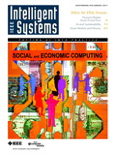
IEEE INTELLIGENT SYSTEMS
Transforming Challenges into Intelligent InnovationsIEEE Intelligent Systems, published by the renowned IEEE Computer Society, stands at the forefront of research in the fields of Artificial Intelligence and Computer Networks and Communications. With an impressive Q1 ranking in both categories as of 2023 and Scopus rankings placing it in the top 5% of its field, this journal not only showcases cutting-edge scientific advancements but also serves as a vital resource for practitioners, academics, and students seeking to deepen their understanding and application of intelligent systems. The journal covers a broad range of topics including machine learning, data mining, and system architectures, reflecting its commitment to addressing contemporary challenges and innovations in technology. Although it does not offer open access, the journal's research contributions are invaluable, ensuring that its readership remains engaged with the latest findings and applications in a rapidly evolving field. For those interested in submitting high-quality research or staying updated on the latest developments, IEEE Intelligent Systems represents an essential hub of knowledge.

Informatics-Basel
Empowering Open Access to Cutting-Edge ResearchInformatics-Basel is a leading international, peer-reviewed journal published by MDPI that has been at the forefront of disseminating high-quality research in the field of informatics since its establishment in 2014. Based in Switzerland, this Open Access journal strives to provide a platform for innovative studies across various domains, including Communication, Computer Networks and Communications, and Human-Computer Interaction, demonstrating its strong impact within these fields with impressive rankings: Q1 in Communication and Q2 in both Computer Networks and Communications and Human-Computer Interaction. Researchers and scholars are encouraged to contribute to the advancing dialogue on critical issues and emerging technologies, as evidenced by its esteemed Scopus rankings, placing it in the top percentiles of its respective categories. With its commitment to elevating knowledge accessibility, Informatics-Basel has become an essential resource for the academic community, stimulating collaboration and the sharing of ideas from 2014 to 2024 and beyond.
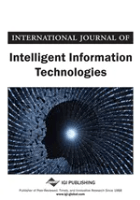
International Journal of Intelligent Information Technologies
Empowering Insights through Innovative Information Technologies.Founded in 2005, the International Journal of Intelligent Information Technologies serves as a pivotal platform for the dissemination of cutting-edge research in the fields of decision sciences and information systems. Published by IGI Global, this journal is dedicated to advancing the understanding of intelligent systems, data analytics, and technological innovations that drive modern decision-making processes. With an ISSN of 1548-3657 and an E-ISSN of 1548-3665, the journal is indexed strategically to ensure visibility among academia and industry professionals. Although it currently holds a ranking in the Q4 quartile of both decision sciences and information systems categories in 2023, it stands out for its comprehensive investigations into best practices and emerging trends in intelligent information technologies. It aims to provide readers with rigorous, peer-reviewed articles that offer practical insights and theoretical frameworks to facilitate informed decision-making in an increasingly data-driven world. Its commitment to quality research makes it an invaluable resource for researchers, professionals, and students alike who are eager to explore new dimensions of technology-assisted decision-making.

JOURNAL OF COMPUTER SCIENCE AND TECHNOLOGY
Elevating Scholarly Discourse in Computer ScienceJOURNAL OF COMPUTER SCIENCE AND TECHNOLOGY, published by Springer Singapore Pte Ltd, is a pivotal platform in the rapidly evolving realms of computer science and technology. With an ISSN of 1000-9000 and an E-ISSN of 1860-4749, this journal encompasses a diverse array of topics including computational theory, hardware and architecture, software engineering, and applications of computer science. Spanning over three decades from 1986 to 2024, it boasts an impressive standing within academic circles, ranking in the Q2 quartile across several key categories and achieving notable placement in Scopus metrics. Although this journal operates under a subscription-based model, it remains a crucial resource for researchers, professionals, and students seeking to advance their knowledge and contribute to discussions in computer science. The JOURNAL OF COMPUTER SCIENCE AND TECHNOLOGY is committed to fostering innovation and scholarly communication in the field, encouraging submissions that contribute substantive advancements in theory and application.
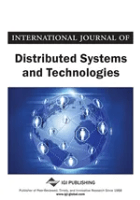
International Journal of Distributed Systems and Technologies
Driving Impactful Discoveries in Distributed Systems.Welcome to the International Journal of Distributed Systems and Technologies, a prominent academic platform published by IGI Global dedicated to advancing the field of distributed systems and technologies. With an ISSN of 1947-3532 and an E-ISSN of 1947-3540, this journal, established in 2010 and continuing through 2024, offers a unique venue for researchers, professionals, and students to disseminate their findings in the realms of computer networks, communications, hardware, and architecture. Despite its current placement in the Q4 quartile for both computer networks and communications and hardware and architecture categories in 2023, the journal is committed to fostering innovative solutions and interdisciplinary collaboration that can drive future advancements. Although not open access, contributions to this journal not only receive rigorous peer review but also have the potential to significantly impact the community, underscored by a focus on applicable research that addresses the emerging challenges in technology. As part of a rich repository, the journal invites you to explore its latest issues and join in shaping the future of distributed systems.
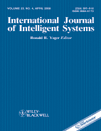
INTERNATIONAL JOURNAL OF INTELLIGENT SYSTEMS
Pioneering Insights in Intelligent Systems ResearchInternational Journal of Intelligent Systems, published by Wiley-Hindawi, stands at the forefront of the Artificial Intelligence, Human-Computer Interaction, Software, and Theoretical Computer Science fields. With an impressive Q1 ranking across multiple categories in 2023 and a robust track record since its inception in 1986, this journal is essential for researchers, professionals, and students alike who are eager to explore cutting-edge innovations and theoretical advancements. Located in the United Kingdom, the journal operates under the esteemed Wiley-Hindawi publishing house, ensuring a broad dissemination of high-quality research articles. The journal's diverse scope encompasses advancements in intelligent systems and their practical applications, fostering an interdisciplinary dialogue that encourages collaboration across various domains. Although Open Access options are not available, subscribers benefit from the rich repository of knowledge this journal offers, making it a vital resource in the rapidly evolving landscape of intelligent technologies.

International Journal of Advanced Computer Science and Applications
Unlocking New Horizons in Computer Science Applications.International Journal of Advanced Computer Science and Applications, published by SCIENCE & INFORMATION SAI ORGANIZATION LTD, stands as a significant platform in the ever-evolving field of computer science. With its ISSN 2158-107X and E-ISSN 2156-5570, the journal aims to disseminate high-quality research and innovations from diverse areas within computer science, embracing cutting-edge technologies and methodologies. As of 2023, it holds a commendable Q3 ranking in the field, placing it among a competitive cohort of journals while showcasing its commitment to scholarly excellence. The journal operates under an open access model, ensuring that its content is widely accessible to researchers, professionals, and students alike, thereby fostering a collaborative environment for knowledge-sharing and advancing the discipline. With a history of converged contributions from 2017 to 2024, the International Journal of Advanced Computer Science and Applications serves as a vital resource for those seeking to stay at the forefront of computer science research and applications.
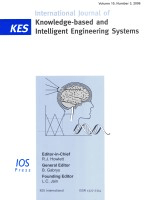
International Journal of Knowledge-Based and Intelligent Engineering Systems
Connecting Minds to Shape the Future of Intelligent SystemsThe International Journal of Knowledge-Based and Intelligent Engineering Systems, published by IOS PRESS, serves as a vital platform for scholars and practitioners involved in the fields of Artificial Intelligence, Control and Systems Engineering, and Software Development. Founded in 2004 and continuously publishing through to 2024, this journal stands out with its comprehensive coverage of innovative methodologies and applications that leverage knowledge-based systems. Although currently listed in Q4 for Artificial Intelligence and Q3 for Control and Systems Engineering, it features an increasing trajectory in the scientific community, as indicated by its rankings in Scopus—which reflects the growing importance of intelligent engineering systems in contemporary research. With a commitment to disseminating cutting-edge research without open access constraints, this journal is essential for those seeking to understand and contribute to advancements in intelligent systems. Join a global community of researchers and industry leaders by engaging with the latest findings shared in this well-regarded journal.
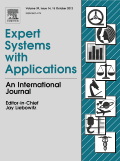
EXPERT SYSTEMS WITH APPLICATIONS
Catalyzing Progress in AI and Computer ScienceEXPERT SYSTEMS WITH APPLICATIONS is a premier journal published by PERGAMON-ELSEVIER SCIENCE LTD, dedicated to showcasing cutting-edge research in the fields of Artificial Intelligence, Computer Science Applications, and Engineering. With an esteemed Q1 ranking across multiple categories, this journal not only reflects high-quality scholarship but also plays a pivotal role in advancing the application of expert systems and intelligent technologies in various sectors. Operating from the United Kingdom, it features a wide range of insightful articles that address complex challenges and offer innovative solutions through interdisciplinary approaches. Researchers and practitioners can access invaluable resources to inform their work, contributing to the journal's strong reputation and growing readership. With its convergence of relevant technologies from 1990 to 2025, EXPERT SYSTEMS WITH APPLICATIONS stands as an essential source for those aiming to push the boundaries of knowledge in these thriving fields, making it a key platform for both established experts and emerging scholars.